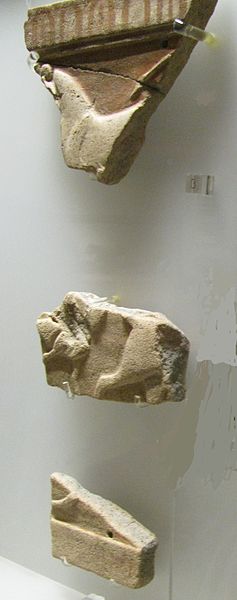The Roman Kingdom, also referred to as the Roman monarchy or the regal period of ancient Rome, was the earliest period of Roman history when the city and its territory were ruled by kings. According to tradition, the Roman Kingdom began with the city's founding c. 753 BC, with settlements around the Palatine Hill along the river Tiber in central Italy, and ended with the overthrow of the kings and the establishment of the Republic c. 509 BC.
The ancient quarters of Rome
Shards of terracotta decorative plaques, 6th century BC (Roman Kingdom and Etruscan period), found in the Roman Forum, now in the Diocletian Baths Museum, Rome
Growth of the city region during the kingdom
Ancus Marcius depicted on a 57 BC denarius
In modern historiography, ancient Rome encompasses the founding of the Italian city of Rome in the 8th century BC, the Roman Kingdom, Roman Republic, Roman Empire, and the collapse of the Western Roman Empire in the 5th century AD.
The Capitoline Wolf, now illustrating the legend that a she-wolf suckled Romulus and Remus after their mother's imprisonment in Alba Longa
Etruscan painting of dancer and musicians from the Tomb of the Leopards in Tarquinia
The Capitoline Brutus, a bust traditionally identified as L. Junius Brutus, one of the founders of the Republic
The Roman siege of the Celtiberian stronghold of Numantia in Spain in 133 BC







